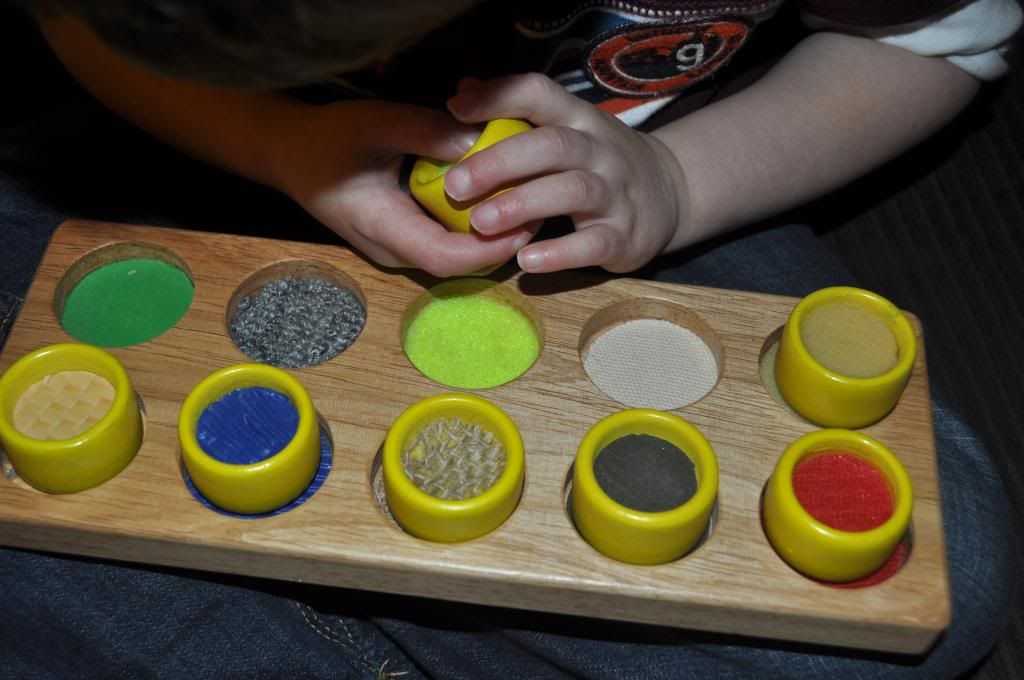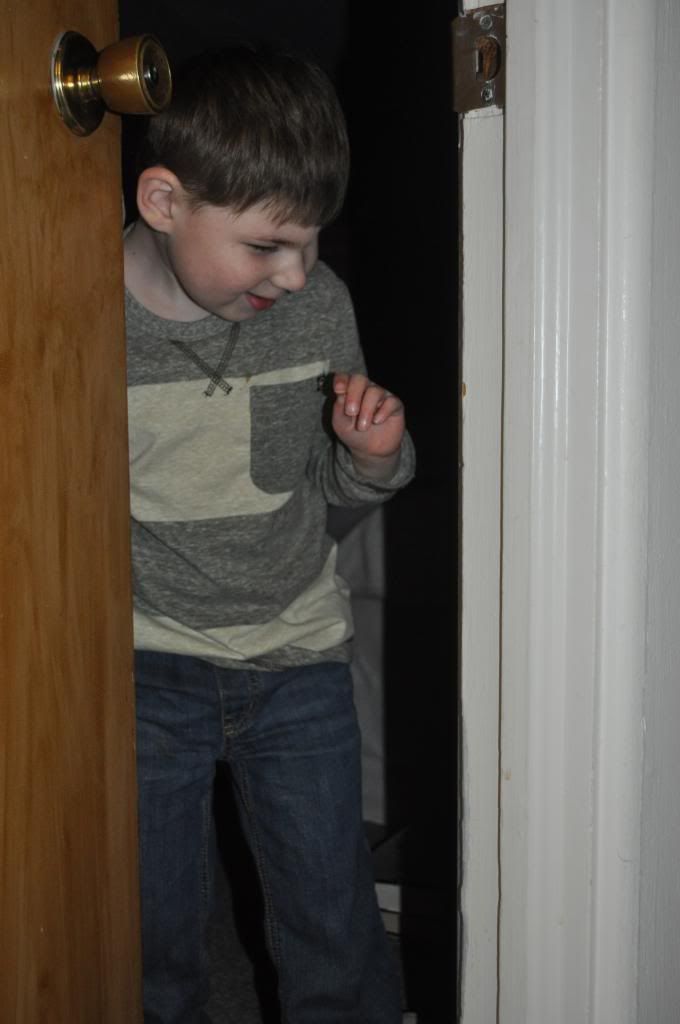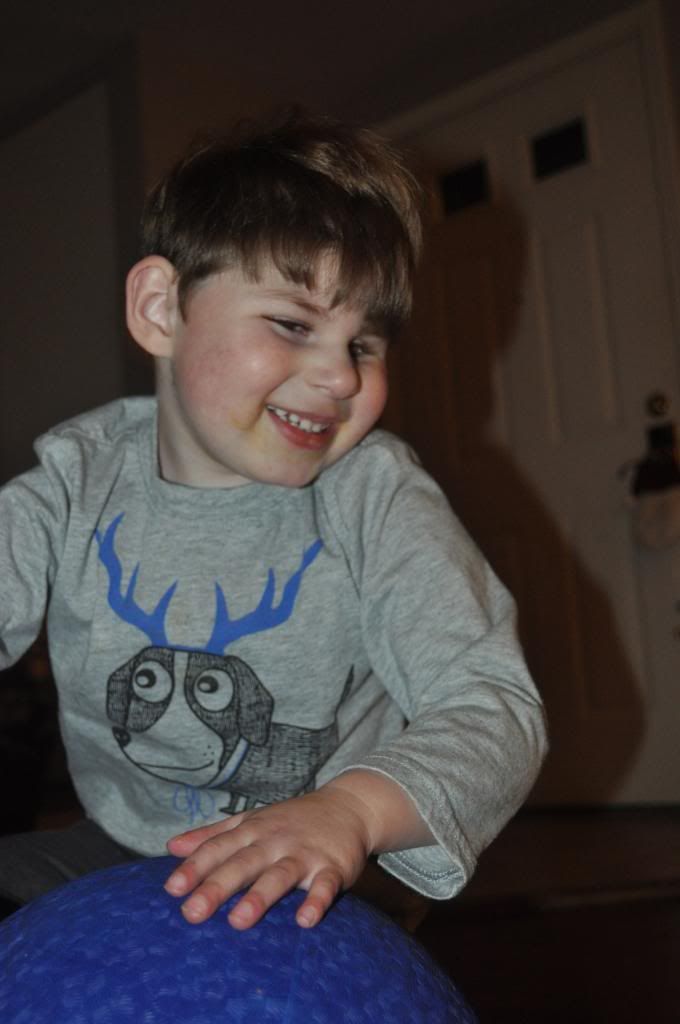Why is Tommy blind?
The simple answer is because that's the way he was made. Tommy was born with bilateral (both eyes) retinal detachments due to a condition called Persistent Fetal Vasculature Syndrome. His eyes just did not form correctly. As soon as he was born the doctors knew that Tommy was something special and they began testing and prodding away. We jumped head first into parenting and special needs on day one.
Will Tommy learn Braille?
Yes. Tommy is already learning pre-Braille skills and being exposed to Braille at school and at home. Just as a sighted child would encounter text in their everyday life, a blind child should encounter Braille. We have labels all over the house and tons of Braille books.
 |
| Texture matching puzzles are a great pre-Braille activity. |
But let me tell you, I have never heard someone regret learning Braille, while I have read many accounts of people regretting they did not learn Braille. For someone like Tommy, who only has a bit of light perception, Braille is his only option for literacy. And if you can't spell or write then you are not literate! So bring on the Braille.
How do you stay so positive?
Because I am generally a positive person. A little sarcastic, but still mostly positive. And because our life is not a tragedy. Sure, we have more to deal with than some people, but everyone has something going on if you look deep enough. We all have our challenges. Tom has different challenges due to his blindness, but he also has many unique opportunities BECAUSE of his blindness. He goes to a fabulous preschool at our local school for blind children. I could not hope to afford one that awesome!
Why do you blog?
I blog because people still meet Tommy and feel sad when they look at him. All they can see is his blindness and not the happy child right in front of them. Sometimes sighted people are burdened by their sight. We can't get past our own viewpoint to see that plenty of blind people are perfectly happy. They are not broken sighted people.
Maybe someone that has gone blind might have that feeling, but Tommy never had sight so he does not miss it. And I have seen and met children who have lost their sight who have adjusted to their blindness very well. So here I am, blogging for Tommy until he is old enough to tell you himself.
 |
| You never know where you will find Tommy hiding. But he loves slamming doors which is a good giveaway. |
Very well! He just goes and does what he wants to do. Since he began walking we have been telling him to put his bumpers up. He walks with his hands out a bit to feel for obstacles or walls. We have visual preview and he has tactile preview. A long white can is just another way to preview what is coming up. He also notes the change in flooring for orientation and pays attention to the different sounds different types of flooring makes. When we are somewhere new he almost always reaches down to pat the floor and always takes notice of when flooring transitions from carpet to wood or vice versa.
He has free reign of the house and goes up and down the stairs on his own. We try very hard to treat Tommy as we would treat any four-year-old. It can be hard as a parent but it is the best way. He can't grow up thinking he is made of glass. We wrestle and play. Tommy got a Power Wheels quad this summer and we run around the yard chasing after him when he rides it. Hey, it's good exercise for us!
Any more questions? Leave them in a comment and I'll answer them in a post.

Did you have trouble transitioning from the crib to a bed? This is something we should be doing soon, but frankly it's terrifying me! Ben loves to run around in his crib before he goes to sleep... I can't imagine what he'd do in a toddler bed!
ReplyDeleteSleep is not our strong suit. Tom almost never slept as a baby. As a toddler we started him on melatonin and it helped. He always wakes up in the night.
DeleteBut it didn't seem worse when we changed from crib to toddler bed. It seemed safer because there was less wood for him to bump into. The toddler bed actually worked much better for us. We are thinking of transitioning his toddler bed to a full bed and seeing if he does better in that. He sure loves his parents big bed!!
You are such a great advocate! I love this: "We can't get past our own viewpoint to see that plenty of blind people are perfectly happy. They are not broken sighted people."
ReplyDeleteAww. Thanks. I think it is just a whole different way of thinking for many.
DeleteHi its good to see someone out thete putting a positive message out there about our blind children. My son is kyren he is 8 he also has been blind from birth he has Norries disease he has no retina and has no light perception. Your stories about your son remind me of the things kyren did when he was younger. Kyen attends a main stream school ans is braille literate. He began familiarising wirh braile when he was about one.
ReplyDeleteThank you for sharing this. Sounds exactly how I want to raise my 4-month-old boy who was diagnosed with severe vision loss, although we don't know to what extent yet. Your blog is a great inspiration!
ReplyDeleteis blindness Tommy's only challenge right now?
ReplyDeleteHi,
DeleteTommy is also working to eat by mouth. He has had a g-tube (feeding tube) since he turned 1. He is down to two bolus feeds (in the morning and before bed.) He gets a bolus of hydration in the afternoon at school. He now eats snacks, lunch and dinner by mouth.
Honestly, the g-tube and Tom's feeding issues (Failure to thrive and food refusal as a baby) have been harder to deal with than blindness. The blindness is just how he does things. He lives it and is adapted to it. Tom always finds a way to do what he wants. The feeding issues are hard because he has very little hunger or thirst. He could happily not eat! But it is getting better and Tommy is now enjoying and even asking for foods. I know we will get rid of the feeding tube someday but it has been a long process to get Tom to eat by mouth.
Tom has no gastro problems. We don't know why he has this relationship with food. He has since about six months of age and he has been tested for everything.
Tom also has hypertonicity but he has full range of motion due to the physical therapy he has received for years.
Tom also has some delays but is doing really well. Some kids follow their own schedule! Technically, Tom has microcephaly, immature gyral pattern, and a hypo plastic corpus callosum. His brain was underdeveloped when he was born. Some kids with similar conditions cannot sit up or talk. Somehow Tom's brain is working around the challenges it has and we are thankful.
Love your blog! I am a teacher of the visually impaired = ) It's great that he is already being introduced to braille! Braille, Braille, Braille everywhere!!! Below is one of my student's blogs. Feel free to stop by and leave comments!
ReplyDeletehttp://lifethroughmyeyes2013.weebly.com/student-journal.html
What a fantastic, inspiring post and so well written! It's parents like you and disability charities who will hopefully start to change perceptions about 'disability'. Attitudes have slowly changed over the decades, so here's to faster to change so that people realised that we're all 'disabled' in some ways and we're all 'able bodied' in others whether we officially have a label or not!
ReplyDeleteHi Eleanorjane,
DeleteThanks for your kind words about the blog. There is a real need for conversations about disability. It needs to be common to see people with a disability out in the community or at work. The more we talk about it the more normal it becomes.
And yes, we all have our limitations - I will never be a ballerina and I accept that, but there are many, many things I can do. We should think of everyone in those terms- not by what they can't do but by what they can do. Tom will have a world of possibilities open to him.
Hi- I did see this blog. I found it on Twitter and shared it on there. Haven't had a moment to share it on the blog yet so thank you for including the link.
ReplyDeleteI can't believe you know that kid! Lucky you. He sounds amazing! I'm so glad he blogs. As the parent or a blind preschooler, it is really cool to see how a 5th grader is doing. It's like peering into the future!
Hi Jessica,
ReplyDeleteWe love your blog! Would you consider adding The Hadley School for the Blind to your resources section? We offer free, distance education courses and seminars for parents, grandparents and other family members of visually impaired children through our Family Education Program. Our web site is www.hadley.edu. Our toll-free phone number is: 800-323-4238. Please contact me if you have any questions or need any more information: kate@hadley.edu. Thank you!
HI Katie,
DeleteI'm blushing that you read my blog. So cool! I added you to my resource page. I don't know why it wasn't on there. Hadley is awesome!!
ReplyDeleteI am happy to find your blog. Children who have specific disabilities such as the blind should be treated specifically so that he could get something that is important to him, such as education, literacy, and so on.
What you described here is very interesting. We all should have a special concern for their education so that they also have the ability like us. Disability, both physically or for any reason, is something that must be accepted. Children who have special permanent disability should be treated like a healthy child.
That's right Sudarto! People with a disability can still be healthy, competent people. So shouldn't we treat them like that for the beginning? :)
DeleteGlad you found the blog.